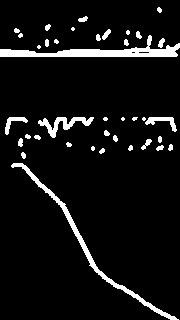I was going to do something food-related as my 30 Day Challenge for May 2012, to encourage me to cook more, but I ended up spending the first few days in transit, and so that just wasn’t a viable option. What I decided to do instead was something a little simpler:
Mostly this has been done while walking, usually walking home from work. My favourite tactic is simply to fake-laugh with really corny “Ha, ha”s or “Pfffts”, until eventually it sounds so silly that I just start laughing. It started when I made myself laugh simply by thinking that it would be funny to challenge myself to make myself laugh.
This past weekend, I was in Ottawa for the Ontario Regional Contact Jam, which is basically a dance retreat. It was an amazing experience on all levels. One of the coolest moments was when I entered one of the floors, and the lights were out… some people were still, some were dancing, and two were laying in a corner, chanting or singing. I laid down next to them and began adding a bassline, and we sang all sorts of wild things, a few other people joining us. At some point, laughter came to mind (perhaps I heard somebody chuckle) and it occurred to me that this would be the perfect time to laugh.
“Ha…hahaha…haha…” I sang breathily, then promptly burst out laughing at how ridiculous it sounded. After a few seconds of me laughing, others found themselves drawn into a fit of laughter as well. More people heard the commotion and came to investigate, and ultimately we had a pile of maybe 15 or 20 people laughing in full.
This continued, ebbing and flowing, for probably five to ten straight minutes before ultimately turning into song again. When we finally broke up (the lights were turned on) we had all had an immense ab workout and were feeling so relaxed and simultaneously energized. It was an amazing experience, and several people commented to me that they hadn’t laughed that hard in a decade. Personally, I think it’s the most I’ve laughed in my life, although that’s a record can’t wait to beat.
—
That was going to be the end of the post, but it occurred to me you might like some laughter yourself. In such a case, try this video of purportedly “the man with the most contagious laugh in the world.”
—
Laughing Otters image by Jenny Rollo.
I want to have reflection time. How am I going to do that?
I’ve been intending a while bunch, lately, to “take some time and reflect,” referring to a whole host of topics I’d like to reflect on, from romance to school to my blog to my habits to my goals (individually and as a whole) to setting up a system to easily track failures and improve on them. I have done brief goal reflections, but otherwise that’s pretty much it.
Ultimately I’d like to reflect on a very regular basis. If I could find a way to do it, twice daily would be optimal. It wouldn’t have to be for long. The morning could just consist of looking at my agenda for the day, planning the main things I want to accomplish, and reading an inspirational quotation or something. The night would consist of (ideally) an assessment of my day, reviewing how it met, exceeded, and fell short of my expectations, and then noting if there are any patterns of failure that I notice. Then, I’ll figure out what’s causing the failure and come up with potential ways to address it.
In a multilayered cake of irony, it was the lack of reflection that was causing itself. My not reflecting led me to not address my failure to reflect. (rinse, repeat). I have recognized for over a week (I distinctly recall wanting to reflect last sunday) that I wanted to do something about this, but haven’t done anything because it’s never felt like the right time to do anything about it. The idea with the reflections is that they’d give me regular chances to tune into those thoughts that have been hopping around anxiously on my back-burner, before they get burnt.
One fortunate thing is that this particular revelation comes to me at a moment when I have got myself into a reasonably regular (and early) sleep-waking situation. This is not habitual, but merely a necessity given 9am exams every other day. Even still, I think I’m going to start this with an MEA (term courtesy of Nir Eyal, though ZenHabits has written about the principle extensively as well). MEA = Minimum Enjoyable Action, and is basically the smallest form of the habit possible. It must be so small that: a) you can’t fail & b) you can’t complain.
I can’t possibly get up late enough that I don’t have time to write a sentence, and I can’t possibly be so tired that I can’t write a sentence. Long term, I’d potentially like to have a form I fill out with fields expressing certain things about my day, but I’ll get there eventually. This is a start.
If that doesn’t work, I’ll scale back the MEA to “pick up a pencil”. That I can definitely do every day.
(While selecting a category for this post, it occurs to me that despite years of reading ZenHabits, I still had not really been focusing my personal development around habits. That changes today.)

This mockup of what drawing was like on my touchscreen shows clearly which parts of the screen don't work.
I’ve been the owner of an Android phone (HTC Incredible S) for 9 months now, but today I sent it off to get serviced because the touchscreen has been acting up. I first noticed the touchscreen behaving strangely this fall, when horizontal bands of the screen would sometimes be unresponsive. On the right, in a mockup of a drawing app, you can see how poking the screen produced no dots on the band, and so on. This was even more annoying when trying to type, because the bottom band passed right through the home-row (if you can still call it that on a touchscreen) of the keyboard.
Anyway, at first it would just do this for a few minutes every day, but then it started to act up like this consistently. The problems got progressively worse until by mid-January I could never be certain at any given moment that I’d be able to use my phone at all. Furthermore, touch events started happening in the wrong places—I would try to select “Yes” and the screen would select “No”, or taps would become long presses. Sometimes the phone would seem to think I had touched somewhere on the screen when it was sitting a foot away on my desk, and would navigate interfaces on its own.

I think this is a terrible analogy, because I think EQ is easier to assess on the surface than IQ is. Anyway, I didn't make the image.
Emotional intelligence (hereafter EI, though often called EQ like IQ) is a term that is used to describe one’s ability to perceive others’ emotions and response appropriately in social situations. As the image here from Psychology Today illustrates, EQ is ascribed a fair amount of importance. The same concept is also embodied in maxims like “It’s not what you know, but who you know”.
So if we were to map the concept of IQ to technology, it could refer to a number of things, but at the forefront is processing power and efficiency/effectiveness of algorithms. Of additional consideration is the ability to learn new things, which is likely where the concept of a smartphone comes from: in addition to built-in phone features like SMS and alarms, smartphones can play games, interact with social networks, and let us draw, to mention just some of the hundreds of thousands of apps out there.
How, then, would we map EI, or EQ? Emotional intelligence, for a computer or smartphone, or any piece of software, is its interface. A piece of software has good EI if it responds the way you expect it to, and even better EI if it anticipates your needs and makes it easy to accomplish your goals. When our technology does this, we adore it, and when it fails to do so, we abhor it.
However, this feeling of dislike can actually go further than just general annoyance or frustration at an inability to properly perform a task using some interface. I realized this rather profoundly with my defective smartphone when I had been trying in vain for probably five minutes to do something really simple like call someone. I was completely unable to navigate the interface because the screen would constantly press other places or simply refuse to push where I wanted. How do you think I felt? I’m actually going to give you space to guess. Think of an adjective that you would expect to most accurately describe my feelings at that point.
Did you say frustrated? Angry? Disgusted? Resentful? Those are all true, but that’s not exactly right. When I couldn’t use the interface, I felt hurt. It sounds odd, but I had an emotional response in my chest that I’ve recognized as the one I feel when someone is being cruel to me (I was bullied a bit when I was younger). It was probably the second time I had this response that I realized how strange that was. After all, at no point in this process had anyone set out to hurt me. Why did I feel like my phone was being mean to me?
After some reflection, I concluded that how I really felt was misunderstood. I was trying to communicate with my phone, via its touchscreen interface (which was designed for human fingers) and it seemed to be completely misunderstanding my instructions and ignoring them or vehemently disobeying them. I had unwittingly personified my phone to a huge extent, so it really hurt when I felt like it was ignoring me while I was going out of my way to communicate with it (eg. turning the phone to put UI elements in different places so I could access them). This would be like asking someone close to you (smartphones are companions) for help and having them plug their ears, sing, and then do something random that might be slightly related to what you were asking. They’d be taunting you.
I’m a designer, a hacker, and an engineering student, so I make things with interfaces. In fact, I’m quite passionate about user experience (UX) and interface design. While my phone’s flaky touchscreen was obviously not intentional, I believe that what I’ve learned here apply into conscious interface design as well. This kind of revelation is less of a “how” than a “why”. That is, prior to these experiences, I had had no idea that interfaces could cause such an emotional impact.
When my smartphone became stupid, it didn’t lose processing power. It simply lost the ability to communicate with me, and that felt far worse than I could have possibly expected. I’m going to remember this every time I design an interface.
 I recently started reading Makers by Cory Doctorow. It’s a freaking amazing book. It contains such awesome bits of technology, culture, and psychology. Like, this book seriously satisfies on all levels. Going to have to say it’s one of my favourite books so far. I’m definitely planning to check out more of Cory Doctorow’s stuff… once I get through a bunch of the other books I have to read.
I recently started reading Makers by Cory Doctorow. It’s a freaking amazing book. It contains such awesome bits of technology, culture, and psychology. Like, this book seriously satisfies on all levels. Going to have to say it’s one of my favourite books so far. I’m definitely planning to check out more of Cory Doctorow’s stuff… once I get through a bunch of the other books I have to read.
A realization of…
…has prompted me to seriously reconsider how many books I have on my to-read list. That list grows at a rate of 3-4 per week, which is vastly unsustainable. I need to use more discretion in choosing books. I think I’m going to do a bit of triaging with the ones I currently possess:
I really don’t know what to put in slot #2. It’s like I tell people about humor: there are enough videos on youtube to keep you laughing out loud for the rest of your life, but those videos represent only a tiny fraction of the 15000 hours of video that are uploaded every minute (or whatever the astonishing rate is). Thus, there are videos that are worth watching, and videos that are not… and then, of course, some that you need to watch some of in order to find out. It’s a challenge, in this day and age, not to let quality get diluted by unquality. I personally believe YT should display the ratings bar under the thumbnail of each video, whereever it’s linked. Anything with green less than 2/3 is probably not worth watching (unless it’s controversial or whatnot).
So maybe there is no #2. I guess it can be:
…but do I really have time to do that for all of the “maybes”?
Am I judging books by their covers? Yes and no. I’m not judging them purely on the visuals and the title. I am, however, suggesting that if you wait until you turn the last page of a book before judging if it was worth reading, you’re not going to be able to do that with as many books.